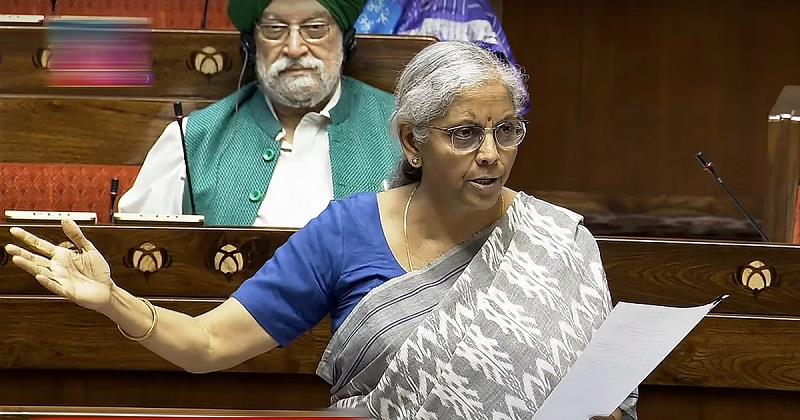
Budget Eased Tax Burden Of Middle Class, LTCG Changes Reflect People's Expectations: Sitharaman
Replying to a debate on Finance Bill (No.2), 2024 in the Lok Sabha, she said the tax incidence on the middle class has been reduced with the increase in standard deduction by 50 per cent and the Budget brings about simplification of tax regime without raising rates.
ADVERTISEMENTWith opposition parties using her colleague and Union Minister Nitin Gadkari's demand for reduction in GST on health insurance premium to attack the government, Sitharaman said states levied taxes on premiums before the uniform GST came into being in 2017.
Parliament, she said, was not the forum to decide the GST rates and it has to go to a council where the states have two-third representation.
After the reply, the lower house passed by voice vote the Bill including 45 amendments. The major amendment was on the levy of capital gains tax on immovable property transactions.
Read Also Financial Position Of J&K Has Improved: FM FM Unveils Rs 1.18 Lakh Crore Budget for J&KOpposition MPs staged a walkout from the Lok Sabha after an amendment moved by RSP member N K Premachandran seeking withdrawal of 18 per cent GST on medical and life insurance premiums was not taken up.
The amendment in Finance Bill relating to LTCG tax restored indexation benefit on sale of properties bought prior to July 23, 2024. Now, individuals or HuFs who purchased houses before July 23, 2024, can opt to pay LTCG tax under the new scheme at the rate of 12.5 per cent without indexation or claim the indexation benefit and pay 20 per cent tax.
Sitharaman in her Budget for 2024-25 had lowered the long-term capital gains (LTCG) tax on real estate to 12.5 per cent from 20 per cent without the indexation benefit. This had come in for criticism particularly from the middle class who felt the LTCG tax liability has been increased.
In her reply, the minister, however, said there was no increase in tax incidence even in hypothetical computations and the benefit of rollover in case of new property purchases was retained.
The change in LTCG tax rate was not a revenue generating exercise or“greed” but an attempt to bring about parity among similar asset classes. The change gives a“fairer option and a choice to the property holder”.
To assuage concerns, the option of indexation benefit has now been brought back for properties purchased before July 23, 2024, she said.
Sitharaman said she had since her first budget in 2019 gone around the country seeking inputs from various stakeholders and returned to Parliament with amendments to meet common people's aspiration.
The current amendment is in line with the same approach -“will be representative of common people's aspiration”.
The minister also said that the FY25 Budget proposals were aimed at promoting investment, besides benefiting the middle class.
She said that the hike in tax exemption limit on long-term capital gains in listed equities and bonds to Rs 1.25 lakh from Rs 1 lakh will benefit the middle class investing in stock markets.
The Modi government, she said, has brought in a simplified taxation regime and eased compliance without drastically increasing taxes. The reduction in customs duty on various goods will promote trade and investment and generate employment, she added.
Sitharaman further said there has been a substantial shift in taxpayer preference towards new tax regime over the span of just one year. For Assessment Year 2024-25, 5.25 crore individuals or 72.8 per cent out of a total 7.22 crore ITRs filed in same category until July 31, 2024, opted for new tax regime.
This is higher than 30.93 lakh individuals who filed ITRs in new tax regime in AY 2023-24.
She said the effective tax on annual income of Rs 15 lakh was reduced to 10 per cent in 2023 and further reduced this year as well under the new I-T regime.
The revision in the slabs in the new income tax regime in 2023 had resulted in tax savings of Rs 37,500 to individuals. Further tweaks in the current fiscal and increase in standard deduction to Rs 75,000 from Rs 50,000 would provide relief of Rs 17,500 to salaried class.

Legal Disclaimer:
MENAFN provides the
information “as is” without warranty of any kind. We do not accept
any responsibility or liability for the accuracy, content, images,
videos, licenses, completeness, legality, or reliability of the information
contained in this article. If you have any complaints or copyright
issues related to this article, kindly contact the provider above.


















Comments
No comment